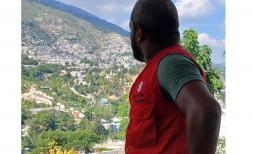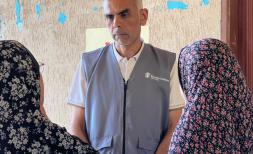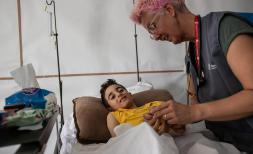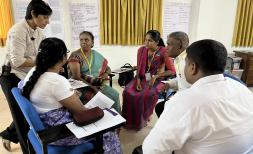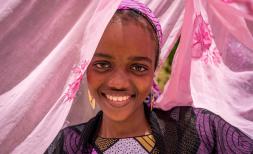Escaping Artillery Fire: A Family's Harrowing Experience Trapped in Sudan
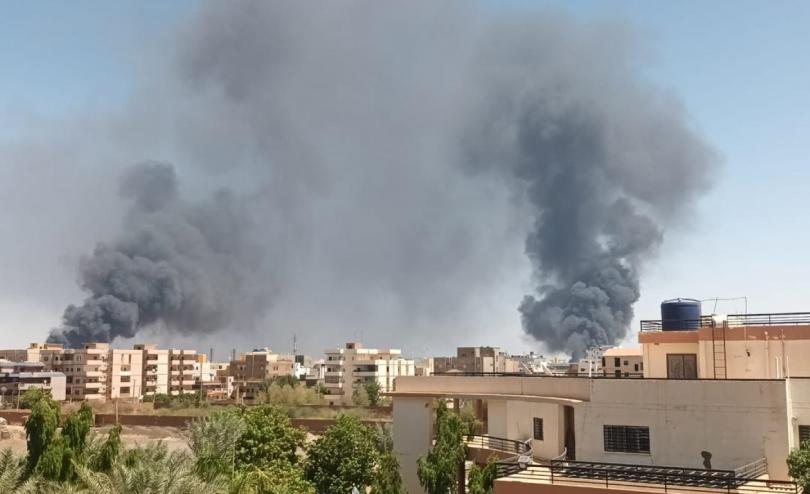
Scenes of destruction from Omer’s window in Khartoum, Sudan. Photo: Omer Sharfy/Save the Children.
The scenes out of my window in Sudan have been almost incomprehensible. Streets that were once a familiar walking route for my family are now battlefields.
It has been one month since the fighting started but it feels like an eternity. I never thought I would be responding to a humanitarian emergency on this scale in my own country, let alone in my own backyard, in Khartoum.
My neighbours fled within 48 hours of the outbreak after artillery and shelling damaged their house. I remained in Khartoum for another week, convinced we could stay safe, sheltering inside our home. But when a rocket landed nearby, I knew the violence had escalated to a point where staying was no longer an option for my family.
We packed up everything as quickly as we could and fled to a city two and a half hours away. During our evacuation, I saw escaped prisoners walking the streets, shops being looted, and fighter jets shelling neighbourhoods below.
Escaping Khartoum wasn’t easy for anyone in my family, especially for my two-year-old son and pregnant wife. We left with my brother and my two grandmothers; one of whom is in a wheelchair and the other is running out of her heart medication.
We don’t know the next time we will be able to refill my grandmother's prescription. She only had 10 days of medication at the start of the conflict, which passed long ago.
Medicine is extremely scarce in the country with hospitals and health clinics being looted daily, stripping life-saving medical supplies from millions. Even before the fighting, Sudan’s healthcare system was struggling to keep up with the needs of its nearly 46 million people. Now, the system is shattered.
When intense clashes erupted in Khartoum on April 15th, my son, who appeared okay with the sounds he was hearing at first, became terrified when the noises grew louder and more violent. Every sound of gunfire rained terror in my house. At just two years old, my son knew that something wasn’t right and felt the urge to run off in search of safety. About 10 minutes later, I found him hiding under the bed.
While on the move to keep my loved ones safe, maintaining contact with my colleagues at Save the Children has been difficult with the internet connection frequently disrupted and communications patchy at best. My days, once concerned with ensuring we reached those most vulnerable in Sudan, have taken a sudden and sobering turn, as we are now those people as well.
More than 600 civilians, including about 190 children, have been killed in the past month. Millions of others are sheltering with no water, food or electricity. My family relied on just lentils to survive in Khartoum, but with our systems in utter shock, we could barely finish a meal.
In some areas in Sudan, the price of basic commodities, like bottled water, food and fuel for cooking, has risen by 40-60%, making it extremely difficult for families who need it most. Every time I go to the market here, the prices soar once again.
Having grown up in Sudan, and now as a humanitarian worker with Save the Children, I’m no stranger to violence and unrest, but this time it’s different. Decades of civil war have scarred our country, but nothing could have prepared me for the scale of destruction and chaos that is now unfolding.
Expired passports and expensive visas are now preventing us from escaping Sudan. All I can do for now is keep my family safe and hope that we'll make it out together.
Donate to our Child Emergency Fund and help us support children living in crisis in countries like Sudan and around the world.
For further enquiries please contact:
- Samantha Halyk, acting Head of Global News, Samantha.halyk@savethechildren.org (based in London)
- Our media out-of-hours (BST) contact is media@savethechildren.org.uk / +44(0)7831 650409
We have spokespersons available outside Khartoum and in Kenya.
